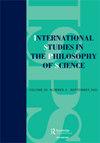Linguistic Discrimination in Science: Can English Disfluency Help Debias Scientific Research?
IF 0.8
2区 哲学
Q2 HISTORY & PHILOSOPHY OF SCIENCE
International Studies in the Philosophy of Science
Pub Date : 2023-01-02
DOI:10.1080/02698595.2023.2251676
引用次数: 1
Abstract
ABSTRACT The English language now dominates scientific communications. Yet, many scientists have English as their second language. Their English proficiency may therefore often be more limited than that of a ‘native speaker’, and their scientific contributions (e.g. manuscripts) in English may frequently contain linguistic features that disrupt the fluency of a reader’s, or listener’s information processing even when the contributions are understandable. Scientific gatekeepers (e.g. journal reviewers) sometimes cite these features to justify negative decisions on manuscripts. Such justifications may rest on the prima facie plausible assumption that linguistic characteristics that hinder fast and easy understandability of scientific contributions are epistemically undesirable in science. I shall raise some doubts about this assumption by drawing on empirical research on processing fluency and its biasing effects. I also argue that directing scientists with English as a foreign language toward approaching ‘native-level’ English can have the negative consequence of reducing their potential to make scientific belief formation more reliable. These points suggest that one seemingly compelling justification for linguistically discriminating against scientific contributions in ‘non-native’ English is questionable and that the common insistence by scientific gatekeepers on ‘native-like’ English may be epistemically harmful to science.科学中的语言歧视:英语不流利能帮助Debias的科学研究吗?
摘要:英语现在主导着科学传播。然而,许多科学家把英语作为他们的第二语言。因此,他们的英语水平通常可能比“母语人士”的英语水平更为有限,而且他们的英语科学贡献(如手稿)可能经常包含语言特征,即使贡献是可以理解的,也会干扰读者或听众信息处理的流畅性。科学看门人(如期刊评审员)有时会引用这些特征来证明对手稿的负面决定是合理的。这些理由可能建立在一个表面上看似合理的假设之上,即阻碍科学贡献的快速和容易理解的语言特征在科学中是不可取的。我将通过对加工流畅性及其偏误效应的实证研究,对这一假设提出一些质疑。我还认为,指导将英语作为外语的科学家接近“母语水平”的英语可能会产生负面后果,降低他们使科学信念形成更加可靠的潜力。这些观点表明,在“非母语”英语中对科学贡献进行语言歧视的一个看似令人信服的理由是值得怀疑的,科学看门人对“类母语”英语的普遍坚持可能在认识上对科学有害。
本文章由计算机程序翻译,如有差异,请以英文原文为准。
求助全文
约1分钟内获得全文
求助全文
来源期刊

International Studies in the Philosophy of Science
HISTORY & PHILOSOPHY OF SCIENCE-
自引率
12.50%
发文量
10
期刊介绍:
International Studies in the Philosophy of Science is a scholarly journal dedicated to publishing original research in philosophy of science and in philosophically informed history and sociology of science. Its scope includes the foundations and methodology of the natural, social, and human sciences, philosophical implications of particular scientific theories, and broader philosophical reflection on science. The editors invite contributions not only from philosophers, historians, and sociologists of science, but also from researchers in the sciences. The journal publishes articles from a wide variety of countries and philosophical traditions.
 求助内容:
求助内容: 应助结果提醒方式:
应助结果提醒方式:


